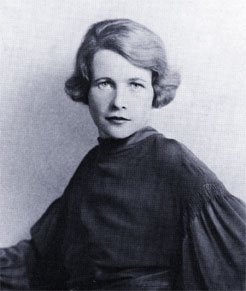Juliette Huxley
Juliette Huxley (née Baillot, 1896–1994) was a French-Swiss author, violinist, and the wife of British evolutionary biologist, Julian Huxley. She played a significant role in her husband's life and work, contributing to the popularization of science and the conservation movement. Juliette's life intersected with many of the 20th century's pivotal moments and intellectual movements, making her an interesting figure in the history of science and culture.
Early Life and Education[edit | edit source]
Juliette Baillot was born in 1896 in Switzerland. Details about her early education are scarce, but she was known to be multilingual and musically talented from a young age. Her proficiency in the violin would later become a significant aspect of her life, allowing her to connect with various intellectual circles.
Marriage to Julian Huxley[edit | edit source]
Juliette met Julian Huxley, a prominent biologist and one of the leading figures in the development of the modern synthesis of evolutionary theory, in the early 20th century. They married in 1919, embarking on a partnership that would intertwine their personal and professional lives. Juliette became an integral part of Julian's career, assisting him in his research, writing, and public engagements.
Contributions to Science and Conservation[edit | edit source]
While Juliette Huxley's contributions were often behind the scenes, she played a crucial role in the advancement of several causes. She was particularly involved in the conservation movement, supporting her husband's efforts in establishing organizations such as the World Wildlife Fund (WWF). Juliette's linguistic skills were invaluable in translating scientific and conservation-related documents, facilitating international collaboration.
Literary Work[edit | edit source]
Juliette Huxley authored several books, blending her interests in nature, music, and travel. Her works reflect her intellectual curiosity and her life's experiences, moving across different cultures and ideas. Although her literary output is not as widely recognized as her husband's, it provides valuable insights into the cultural and scientific milieus of the 20th century.
Later Life[edit | edit source]
After Julian Huxley's death in 1975, Juliette continued to be active in the circles they had both frequented, maintaining their legacy. She lived until 1994, witnessing and contributing to significant cultural and scientific shifts over nearly a century.
Legacy[edit | edit source]
Juliette Huxley's life and work offer a unique perspective on the intersections between science, culture, and conservation. Her contributions, though often overshadowed by her husband's fame, were significant in their own right. She exemplifies the role of women in the scientific and intellectual advancements of the 20th century, serving as a reminder of the collaborative nature of progress.
Search WikiMD
Ad.Tired of being Overweight? Try W8MD's physician weight loss program.
Semaglutide (Ozempic / Wegovy and Tirzepatide (Mounjaro / Zepbound) available.
Advertise on WikiMD
|
WikiMD's Wellness Encyclopedia |
| Let Food Be Thy Medicine Medicine Thy Food - Hippocrates |
Translate this page: - East Asian
中文,
日本,
한국어,
South Asian
हिन्दी,
தமிழ்,
తెలుగు,
Urdu,
ಕನ್ನಡ,
Southeast Asian
Indonesian,
Vietnamese,
Thai,
မြန်မာဘာသာ,
বাংলা
European
español,
Deutsch,
français,
Greek,
português do Brasil,
polski,
română,
русский,
Nederlands,
norsk,
svenska,
suomi,
Italian
Middle Eastern & African
عربى,
Turkish,
Persian,
Hebrew,
Afrikaans,
isiZulu,
Kiswahili,
Other
Bulgarian,
Hungarian,
Czech,
Swedish,
മലയാളം,
मराठी,
ਪੰਜਾਬੀ,
ગુજરાતી,
Portuguese,
Ukrainian
Medical Disclaimer: WikiMD is not a substitute for professional medical advice. The information on WikiMD is provided as an information resource only, may be incorrect, outdated or misleading, and is not to be used or relied on for any diagnostic or treatment purposes. Please consult your health care provider before making any healthcare decisions or for guidance about a specific medical condition. WikiMD expressly disclaims responsibility, and shall have no liability, for any damages, loss, injury, or liability whatsoever suffered as a result of your reliance on the information contained in this site. By visiting this site you agree to the foregoing terms and conditions, which may from time to time be changed or supplemented by WikiMD. If you do not agree to the foregoing terms and conditions, you should not enter or use this site. See full disclaimer.
Credits:Most images are courtesy of Wikimedia commons, and templates Wikipedia, licensed under CC BY SA or similar.
Contributors: Prab R. Tumpati, MD

